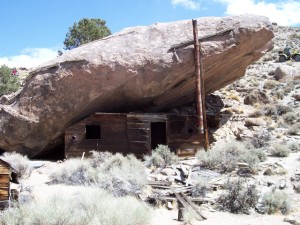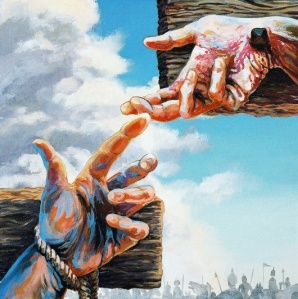In honor of Mother's Day, just around the corner, and Easter Sunday that is just behind us, I thought this story would be appropriate. Quotes that I have italicized are verses directly from the Bible, but all other references in the story are accurate to the Biblical location and time frame, though I've put my own imaginative spin on it...Hope you enjoy.
The woman stood on Calvary’s hill, transfixed by the scene before her. It was not the first time she had witnessed a crucifixion, but it was the first time someone she loved had been the victim of this brutal punishment. She more than loved the dying man—she had given life to him, and in all his growing up years she had believed in his potential. He had a good heart and she cherished the thought that he would be a great leader.
However, his life did not meet the plans a fond mother’s heart had laid out. Despite her attention and concern, he drifted with the wrong crowd, slowly losing respect for Jehovah, the religious ceremonies and traditions, and at last even ignoring the civil laws imposed by the Romans.
As reports filtered back to her of debauchery, thievery, and riotous living, her heart ached for her son. Often she searched herself for some explanation, some mistake that she could attribute his actions to. Where in his upbringing had she failed?
In spite of the accounts of his wickedness, she who knew him best could not believe that the boy, who even now occasionally displayed affection for his aging mother, was entirely beyond hope. Her discerning heart saw in him opportunity for reform.
But all reflections on the past seemed meaningless now—this was the end. Her son had been condemned to death in the most degrading and cruel fashion of the day by the civil authorities who were anxious to crush all lawlessness and rebelliousness in their subjects.
What could she tell them? That her sweet boy was merely a misguided youth? That he had fallen in with the wrong company, but was not beyond hope? Never could she persuade them that an apparently hardened criminal was not as callous as they supposed. It was true that he had stolen, murdered, and committed a host of other hideous crimes that left her aghast. Nevertheless, she felt he needed a second chance—if he were given a clean slate, surely her boy would never again sully it with another wrong act.
That was purely wishful thinking, she realized bitterly, for it was obvious that even God had rejected her son. The Pharisees’ and Sadducee’s teachings offered no hope for one who led a life apart from Jewish beliefs and customs, and even she could not defend his lack of interest in the synagogue. The lack of Divine intervention in this case could only mean that her son’s conduct had pushed him beyond the limits of God’s mercy. Her son was doomed, and she had no recourse but to resign herself to his fate—and her own. For what could she blame his decisions on, but the upbringing he had received in her home? The mother knew that the dark cloud already weighing on her soul would stay with her until her grieving heart was stilled by death.
Her thoughts were interrupted by an outburst of jeers by the priests and rulers nearby. “He saved others; let Him save Himself, if He be Christ, the chosen of God.”
The mother turned her eyes for a moment from her son to the Man beside him, the object of the priests’ and rulers’ mockery. With a start, she recognized Him as the Galilean teacher—purported healer and miracle worker. Many had even said Jesus might be the Messiah, and in spite of His hopeless circumstances, some onlookers were even now whispering His deeds and words among themselves as if unwilling to accept the finality of His situation. Was He not being murdered in the same ruthless fashion as her son? What made His condition any different from that of her son?
Watching Jesus, however, the mother knew immediately that there was something different about Him. He was not angry or rebellious; He did not curse the guards, priests or rulers that were taunting Him. His face expressed pity and concern for…could it be for those who were tormenting Him?
“Does Jesus truly not hate these people who so obviously are reveling in their brutality?” She asked almost unconsciously.
“No, he doesn’t,” a tense voice beside her spoke. It trailed off thoughtfully, “Did you hear Him say, ‘Father, forgive them, for they know not what they do…’”
She turned to see the speaker, an older woman who was obviously agonized by the scene. Forgetting her own grief for a moment, the mother put her arm around the other woman in an attempt to console her.
“Perhaps you shouldn’t be here, watching this spectacle,” the thief’s mother whispered. “I can see it is upsetting you.”
“Why is life so harsh?” Tears formed little rivulets down the older woman’s wrinkled cheek.
As her own pain rose to the forefront, the mother sobbed, “My son is the young man dying on the right, and my heart breaks to watch him suffering. Is your anguish even a portion of mine? I cannot expect you to sympathize, but if you only understood…”
She fell silent, her tears flowing unchecked. The older woman at last replied, “I do understand. You see, my son hangs in the middle. His sign reads “The King of the Jews” in mockery, but I believed with all my heart that He is the king, the Messiah we have been seeking.”
Mary’s dim eyes glazed over with a thousand question marks as she looked up at the other mother. “Why then is He on the cross? If only I knew the explanation. I do not know why He is being crucified. What I do know is that He has given sight to the blind, healed the broken hearted, brought the dead to life and preached deliverance from sin. He does not deserve to die this death, but somehow it is as if He knew all the time that this day would come.”
She looked away from her son’s tortured face, and gestured toward the temple gleaming in the light of the setting sun. “Thirty-three years ago I stood in that temple to give an offering for my newborn son, and a holy prophet gave a blessing, spoke of my son’s great destiny, yet warned that a sword would pierce my heart. When Jesus stood in that same temple twenty-one years ago and said that He must be about His Father’s business, I never would have thought this would be part of it.”
The old woman tearfully looked back at the thief’s mother and reached for her hand. “I wish I could be back in the temple with Him, watching Him preach and heal…but Jesus has done nothing except be about His Father’s business. I believe somehow this is a part of the plan…though I do not understand it at all.”
The mother looked in amazement at the Man on the center cross. Could it be that Jesus’ mother was right—or was she only a biased, grieving mother? Was He the promised Savior, or only another false Messiah?
Her thoughts were again interrupted by another taunt, this time by the thief hanging on the left. “If thou be Christ, save thyself and us.”
She ached for Jesus' mother beside her. The jest seemed so cruel to a dying man.
Suddenly she was astonished to see her son struggle to speak, “Dost not thou fear God, seeing thou art in the same condemnation? And we indeed justly; for we receive the due reward of our deeds: but this man hath done nothing amiss.”
Her heart leapt at his words. He was the same soft hearted son she knew and loved, but more than that, he recognized the folly of his ways and was repentant. If only she had the power to offer him another chance!
She also wondered at his statement, “…this man hath done nothing amiss.” Even her son recognized that this Man, this Jesus of Nazareth, was a good and just man. Perhaps the woman beside her was right…
Her boy was speaking again, “Lord, remember me when thou comest into thy kingdom.”
A dying Man to return with a kingdom? Hope burned in her heart as the ancient prophecies came to mind. This gentle, calm Man might truly be divine—the Son of God.
Now Jesus was responding to her dying son’s request, “Verily I say unto thee today, thou shalt be with me in paradise.”
Suddenly, darkness enveloped the throng on Golgotha as an earthquake shook the scene of execution, but a light brighter than any she had ever known glowed in the mother’s heart. A beam from heaven itself had shone from the cross into her despairing soul to say that her son was not lost. He had strayed, but God had never forgotten him. In his darkest hour, her son had received the promise of eternal life from a Man who was dying, but still was divine.
Tears of relief mingled with the tears of sorrow as the mother looked at the older woman beside her. Even in the gloom, she could see the other mother’s face glow with the light of peace. Her Jesus had come for this purpose, not to save Himself, but to save others in darkness.








